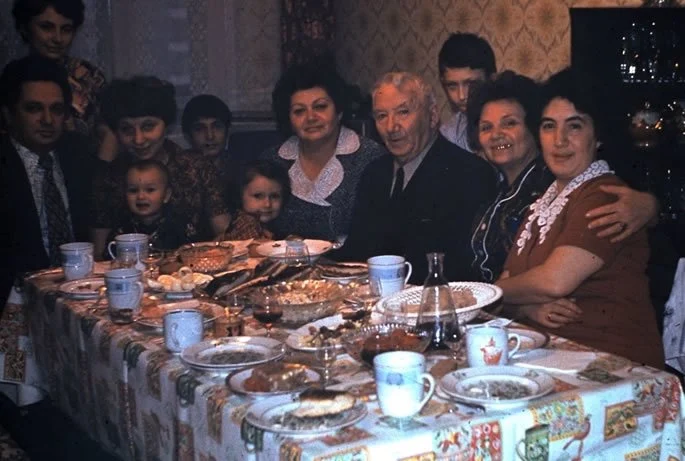Growing up in the former Soviet Union, every adult I knew spent their free time standing in long lines for basic provisions. I distinctly remember my grandmother waking up before dawn to get in line for fresh milk. The Soviet reality wasn’t for the lazy. Being in line didn’t guarantee that there would be enough for everyone waiting. If you overslept and got in line late, you had to wait until the next time.
We constantly worried about rationing the next meal.
Milk was in high demand; it was used to make cottage cheese, butter and kefir that resembled yogurt. (Really, everything was in high demand!)
Poultry was a treasure. It was a craft to cook one chicken in five different dishes—bones in a soup, skin as a kishka, organs sautéed with onions, meat ground and mixed with bread for patties, and small leftover pieces mixed into a pot of noodles.
When people obtained flour and margarine, they baked bread, pies, cookies, cakes and whatever else they could to feed their families. Summers were spent on small, government-distributed plots of land with tiny bungalows and dachas, where people toiled day and night to grow fruits and vegetables. Then these crops were boiled, canned, jammed, dried and salted.
Everything was salvaged and preserved for the hungry winter months. Our dacha was located on the Volga River. My father and I spent time fishing so we could cook meals with whatever we caught from the river. Fish was also salted and dried for the winter months. Candy, chocolate and ice-cream were almost never available. Soviet children received special goody bags at government New Year’s celebrations. Inside were a few tangerines and chocolate candies. It was a “generous” once-a-year treat from the Communist party.
This was the Soviet reality, and adults were used to it. The government wasn’t interested in complaints. In 1989, my family went through two refugee camps in Austria and Italy, where again there was a shortage of food.
For the first 13 years of my life, I often fell asleep dreaming about a mysterious world where food, particularly sweets, was available anytime I wanted. In my imagination, people never had to worry about rationing.
A few days after arriving in the United States, my grandmother Zelda and I went to a small grocery store near our apartment in Philadelphia. I was completely overwhelmed when I walked through the snack aisle. I had never seen so many varieties, colors, shapes and flavors. It simply took my breath away.
Many years have passed, and I still love to stroll through supermarket aisles looking at the rows of colorful products. When I embraced my Jewish heritage and began to learn about Torah values, I connected to the mitzvah of reciting a blessing before eating. It felt inherently natural to channel my appreciation into words of gratitude.
This mitzvah was my way of showing gratitude for the fulfillment of my childhood dream of having access to a plentiful diet any time of the year. I noticed that after reciting the blessing, I became more mindful, and the eating experience itself was enhanced by the pause.
I learned the different blessings that are said. For things that grow in the ground, including vegetables, legumes, peanuts and berries, versus fruits that grow on a tree, such as apples or cherries. In Jewish law, a tree fruit is defined as something growing from a perennial tree that does not renew its stem and does not grow too close to the ground. At times, when I wasn’t clear on what blessing should be recited, I searched for clarifications.
After arriving in the United States, we were surprised to discover that the most popular breakfast food was called cereal. After being taught how to eat it with milk, we bought whatever flavors were on sale every week. Thirty-five years later, I still have not tried every flavor. Now, before biting into a crunchy spoonful, I stop and say the blessing for foods that are made from grain, such as wheat, barley, rye, spelt or oats.
Perhaps my favorite blessing is the one recited before eating chocolate, ice-cream and candies. (It is also said for food that does not grow from the earth, such as meat, chicken, fish and eggs.) I say these words with intention—to remind my inner child to be grateful for all the sweets—and sweetness—in our lives.
Another favorite is the blessing over wine. When my family lived in the refugee camp in Austria, we again had to ration for meals. One day, there was a local harvest celebration and farmers carried crops of grapes through the main street of the town. Together with other immigrants, we stood on the side of the road, as wagons with grapes rolled by. Clusters of luscious grapes were thrown into the crowd, and soon our bags were filled to capacity. I remember the joy of eating sweet grapes for days. My stomach was full, and it was immensely satisfying. After a while, the fruit began to spoil, and my father decided to ferment it into wine. Later, I learned that wine deserves its own special blessing.
Rabbi Isaac Luria, the famous “Ari,” taught that everything in this world possesses a spark of G‑dly energy that creates its essence. When a person utilizes food towards a G‑dly end and pauses to say a blessing, this holy spark is released, fulfilling the purpose for which it was created.
The next time you’re about to bite into an apple, sandwich or chocolate bar, create a mindful space for gratitude. Say a blessing for the food in front of you; pause and appreciate its color, shape, smell and nutrients. After you recite the words of prayer, experience its texture, taste and flavor. Savor this moment as a banquet created for your pleasure and enjoyment.
From Bread Lines to Blessings: How I Learned to Be Grateful for Food – Chabad.org

